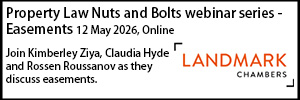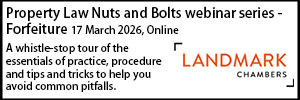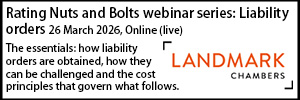Delays have dangerous ends - or do they?
- Details
Peter Wadsley examines the outcome of a recent judicial review case in which the claim was brought six years after the planning decision in question was made.
Overview
Delays have dangerous ends [1] - or do they?
At any rate that was Shakespeare's view on delay and it is generally true in litigation, not least in the Administrative Court where delay in commencing proceedings may result in their summary dismissal, even if they are otherwise well founded.
The case of R (Croyde Area Residents Association) v North Devon District Council and Parkdean Holiday Parks Ltd [2021] EWHC 646 Admin [2]:
- Raises not just the general approach to delay in JR cases but also whether, notwithstanding the long delay, the claim should be allowed to proceed if the challenged grant of planning permission is thoroughly unlawful and would not have been granted if the true extent of the application and the illegality had been appreciated.
- Considers the effect of very long delay on prejudice to the Interested Party (the site owner and holder of the permission) through quashing the permission and also whether there is any, and if so the effect of, prejudice to good administration.
- Deals with a separate issue which arose because the site owner had obtained a certificate of lawful use for the change of use granted by the permission. That certificate is protected by section 192(4) TCPA which says that the lawfulness of any use for which a certificate is in force shall be conclusively presumed. Does that mean, in combination with s. 284 TCPA, the permission from which it was derived could not be quashed?
More generally, generally, in judicial review (JR) there are two obstacles. A claim must be 'brought promptly' [3] and in any event within 3 months [4]. And then section 31(6) Senior Courts Act 1981 provides that the court may refuse to grant (a) leave for the making of the application; or (b) any relief sought on the application, if it considers that the granting of the relief sought would be likely to cause substantial hardship to, or substantially prejudice the rights of, any person or would be detrimental to good administration.
Facts
So a claim which is commenced approximately 6 years after the decision complained of has serious obstacles. The Council had granted a planning permission for the extension of days and hours at a holiday caravan and camping park at Croyde in North Devon. It was a much sought after site for holiday makers, close to a magnificent beach and part of the AONB and Heritage Coast. The park proprietors (Parkdean) wanted to extend their holiday season days and hours and that application was granted on 27th January 2014. All concerned, council officers, 3rd parties and even Parkdean, thought it was for that limited purpose.
However, in January 2018 Parkdean made an application for a certificate of lawful use (CLOPUD) under s. 192 TCPA. They said that the 2014 permission extended to an additional area of land called the Service Field. The irony was that Parkdean had already made, in 2016, a separate application for permission for the use of the Service Field as part of the caravan park and had withdrawn it after heavy opposition from, inter alia, the AONB Partnership.
The Council refused the application for the CLOPUD but it was granted on appeal by a planning Inspector who found that the 2014 permission included the Service Field. This was because the plan on the 2014 permission (read with the conditions) included that field and other undeveloped land within the caravan park and even third party land outside it. This was something that the officers had not spotted when the application was being considered and certainly not something that Parkdean had intended. [5]
The inspector's decision was on 21st February 2020. Not long afterwards the applicants for JR, who were a local residents' group known as CARA, asked the Council to revoke or alter the permission under ss. 97 and 102 TCPA; alternatively, to agree to the permission being quashed. The Council declined to act under ss. 97/102 but said it would agree to the permission being quashed.
CARA therefore launched proceedings on 3rd July 2020 asking for an order that the permission be quashed and for a declaration. Two features of the proceedings were unusual:
- First, the Council conceded at the outset that they had granted the 2014 permission unlawfully and so, eventually, did Parkdean. This was because, as the judge found [23-29], the Council inadvertently granted permission for an extended area of operations which had not been applied for. Furthermore, it failed to appreciate that a screening decision was necessary under the Environmental Impact Regulations and that an EIR assessment would have been necessary. And the Council failed to follow s. 38(6) TCPA and consider whether the development was contrary to a number of development plan policies in 2014 [6] which, by extending the operating area of the park in the AONB and Heritage Coast, it clearly was. [7]
- Parkdean, during the course of the JR proceedings, took steps to obtain a new permission (which the Council had indicated it would be willing to grant) limited to its existing operational area which extended the hours and days in the same way as the 2014 permission. This carried out the agreed intention of the 2014 permission and mitigated any harm that Parkdean might suffer if that permission was quashed.
Necessarily, having conceded the permission's illegality, Parkdean focussed on delay and an additional interesting issue over the grant of the CLOPUD in February 2020 which I consider later.
Argument and judgment
Delay and prejudice to good administration
On delay, it was obvious that the claim was brought well outside the 6 weeks for claims under the TCPA (see CPR 54.5(5)). This involved a consideration of the court's discretion to allow a late claim and the working of s. 31(6) Senior Courts Act 1981 on undue delay; substantial hardship to, or substantial prejudice to the rights of, another; or any detriment to good administration.
The issue of discretion and the application of s. 31(6) are often taken together and that is what happened here as this was a 'rolled-up' hearing (see R. (Thornton Hall Hotel Ltd) v. Wirral MBC [2019] P.T.S.R 1794 at [21(8)]).
The judge dealt with and analysed three periods of delay and then went on to assess prejudice and detriment to good administration. The overall period of delay was something over 6 years and the three periods were the first 4 years (from grant of permission in 2014 to application for the CLOPUD in January 2018); the period thereafter until the Inspector's decision in February 2020; and finally until the application for JR in July 2020.
She had little difficulty with the first and most substantial period of delay. During that period no one, including Parkdean, had appreciated the permission extended to the areas dealt with in the CLOPUD. Even Parkdean accepted that CARA had a good reason for delay during that period [66-67].
As to the second period of just over 2 years while the CLOPUD issue was being decided, CARA said and the judge accepted that it was right to delay because the Council was resisting the grant of the CLOPUD and until the Inspector's decision no proceedings for JR could sensibly have been taken. Parkdean's point on that was that JR proceedings could have been issued [8] and adjourned pending the outcome of the CLOPUD appeal.
The judge did not think that was a decisive feature of the case. It was, she thought, a factor for her to take into account when considering the matters for the exercise of her discretion under the Thornton Hall principles [70-71].
Mrs. Justice Lieven thought that the third period, from February to July 2020, was the most difficult for CARA. Even though it was the shortest of the three periods she found that each of them had to be separately considered and justified [72]. This fits of course with the approach in Thornton Hall at [21(2)]: "When planning permission has been granted, prompt legal action will be required if its lawfulness is to be challenged 'unless very special reasons can be shown' .....". On this period she found that a challenge to the CLOPUD could have been lodged immediately after it was granted. It was not an answer to say that CARA relied on legal advice, even if that had been bad [82].
Looking at the issue of prejudice the judge observed, as had been argued by CARA and the Council:
- While Parkdean was entitled to rely on the grant of the permission the prejudice was limited to the expenses incurred in applying for the CLOPUD and incidental costs like the replacement permission. In her view the real prejudice was the loss of the permission itself. But that permission had been unlawfully granted and no losses from the grant of the permission had been incurred (she would have given great weight to them if they had).
- An example of such losses would have been those incurred in the case cited by the Council, R. (U & Partners) v. Broads Authority [2011], [9] where the Environment Agency had spent some £130,000 in doing work in reliance on the planning permission before being notified of the claim. The EA had clearly suffered prejudice but the irony was that, nevertheless, the permission was quashed by Collins J as it was, inter alia, clearly ultra vires.
- This illustrates another feature of these cases; they are fact specific. Despite the very obvious prejudice suffered by the EA the permission was still quashed. The implication may be that Lieven J would not have quashed that permission, as she would not have quashed this permission if Parkdean could have shown similar prejudice, e.g., by some use of the Service Field and consequent financial loss through ceasing that use.
- But then again, perhaps not. What persuaded Collins J was the clear illegality of the grant of the permission. In this case, Lieven J found that the future financial benefit from use of the Service Field could only result, as was obvious, from the grant of a thoroughly illegal permission and one which would not have been granted if the Council had appreciated the true position.
- Consequently, she gave very little weight to the financial consequences resulting from the loss of a 'windfall', unsought permission [74-76, 83].
- As to detriment to good administration, she thought this was a case of extremes. The delay was exceptional albeit the effect of the permission was not appreciated for 4 years. The delay in the second period was reasonably justifiable albeit to be taken into account in the overall balance.
- What tipped the balance in favour of quashing the permission, despite the delay in the second and third periods and some detriment to good administration in doing so, was the significant intrusion of the holiday park in the AONB 'contrary to a host of local and national policies'. She found that: "the interests of the credibility of the planning system weighs heavily in favour of quashing the permission. It would be very hard to explain to a member of the public why a permission which was granted in complete error and where the developer has now got a permission which gives him what he originally sought, i.e. the extension of operating times, should not be quashed." [86].
- So it could easily be said that good administration demanded the quashing of the permission. Contrariwise, how was it 'good administration' to allow an obviously illegal permission to stand in the face of clear development plan and national policies? As Sedley LJ observed in R. (Corbett) v. Restormel BC, [10] at [32]: "How, one wonders, is good administration ever assisted by upholding an unlawful decision? If there are reasons for not interfering with an unlawful decision, as there are here, they operate not in the interests of good administration but in defiance of it."
In conclusion, on delay it is important to note that if there are separate periods of delay each must be justified. Success on one may still be followed by failure on another and hence a dismissal of an application.
There is of course a balancing exercise. Here a major factor was the overwhelming opposition to the development flowing from the planning policies both in 2014 and 2021 which made it almost impossible that such a scheme could have received permission. The contrary was not seriously argued by Parkdean. A further important factor was the relative lack of prejudice suffered by Parkdean. If it could have pointed to, e.g., substantial expenditure on infrastructure following the grant of the CLOPUD there might, perhaps, have been a different outcome although the planning policies would have counted strongly against them. That is because when assessing delay and prejudice the court should take into account 'the likely consequences of the [impugned decision] being reopened' [11] If that had happened here, it would almost certainly have been refused permission.
The impact of the certificate of lawful use
The second major issue was about the status of the CLOPUD and its susceptibility to challenge. It resulted from the operation of section 284(1) of the TCPA which states so far as relevant:
"Validity of development plans and certain orders, decisions and directions.
(1) Except in so far as may be provided by this Part, the validity of - .......
(f) any such action on the part of the Secretary of State as is mentioned in subsection (3), [This includes the grant of a CLOPUD]
Shall not be questioned in any legal proceedings whatsoever."
This has to be read with s. 288 which provides a procedure for challenging the lawfulness of the grant of a CLOPUD provided proceedings are brought within a short period of time. There is no power to extend time.
Furthermore, s. 192(4) provides that:
(4) The lawfulness of any use or operations for which a certificate is in force under this section shall be conclusively presumed unless there is a material change, before the use is instituted or the operations are begun, in any of the matters relevant to determining such lawfulness."
Based on these provisions Parkdean submitted that there was a statutory bar to CARA's claim. It argued that their effect was that the planning permission upon which the lawfulness of the use in s. 192 is conclusively presumed could not itself be challenged. This was because to do so would be to question the validity of the CLOPUD, contrary to the restriction (or privative provision) in s. 284(1). If the planning permission was quashed, but the CLOPUD stood (because of the effect of s. 284), either the legal position would be wholly unclear, or Parkdean would be deprived of the benefit of the CLOPUD.
The judge rejected these submissions. CARA had submitted that the clear words of the statute showed that the bar in s. 284 only applied to the CLOPUD and not to any planning permission upon which it was based. It pointed out that CLEUDs or CLOPUDs will not always, and indeed often will not, rest on lawfulness stemming from a planning permission. The lawfulness which is certified would frequently be the result of the effluxion of time provisions rather than a pre-existing planning permission. The simple argument was that Parkdean was seeking to extend the words of section 284 to cover the legality of the planning permission when that was not what the statute actually said.
As can be seen from the judgment various authorities were cited on both sides. None were directly in point and the judge approached the problem by considering three issues. The first was that a CLOPUD could only establish lawfulness on a particular date [12] - because it might turn out that it had, e.g., later been abandoned or there was a later material change of use. The judge considered, at [42-44], that this argument was supported by the CA's decision in Staffordshire CC v Challinor [2008] 1 P & CR 10 where Keene LJ said:
"The conclusiveness of the presumption relates only to the lawfulness of the use at [the date of the application]. It will not always be an answer to a subsequent enforcement notice, even if it is raised on appeal, because the use may not have continued until the date of the issue of the notice ... "
The judge considered that this was supported by s. 192(4) relating to CLOPUDs because this refers to the lawfulness being conclusively presumed "unless there is a material change, before the use is instituted...". CARA argued that the material change here would include the quashing of the planning permission. So the statute contemplates that there could be a material change, before the lawful use is implemented, which would stop the presumption of lawfulness in the CLOPUD. Parkdean argued that 192(4) must be a material change on the land, e.g. a material change of use.
The judge preferred CARA's argument observing that this was supported by the judgment of Keene LJ referred to above [46]. She also referred to the difference between CARA and Parkdean about the use that had been implemented: was this the use certified in the CLOPUD namely, the use of the Service Field for the stationing of caravans which had not been implemented (CARA) or the use in the 2014 permission namely, the change of hours/days which had been implemented (Parkdean). In her view, it was the former because the contrary argument would mean that the use in the opening words of s. 192(4) was different from that instituted before the material change which would make no sense. Consequently, the use for the purposes of s. 192(4) had not been implemented [48-49].
There was a dispute whether s. 284 was an ouster clause and therefore should be narrowly construed or merely a time limited challenge which should be construed in accordance with its purpose. Having observed that there were competing authorities on this issue, the judge held that section 284 was not an ouster clause and the starting point should be the words of the statute. On that basis the simple point was that s. 284 on its words did not debar a challenge to the planning permission which underlay the grant of the CLOPUD.
Did CARA's approach undermine the purpose of the statutory provision in section 192, as argued by Parkdean? The judge thought not. Section 192 referred to a conclusive presumption but that was, in fact, limited because there was no absolute certainty of that going forward. The section envisaged a material change in any of the matters relevant to determining lawfulness and this could be something resulting from the quashing of the permission [56-57]. [13]
At the time of writing this Note draft grounds asking for permission to appeal have been submitted by Parkdean. The last point, the statutory bar point, is being pursued and it is submitted the judge was wrong in law to find against Parkdean. There is no appeal on the ground that the decision was contrary to good administration but there is on the basis that the judge was 'clearly wrong' to find good reason for clearly and grant an extension of time and thus to quash the permission.
So the 6 year saga may continue!
Peter Wadsley is head of the Public & Administrative Law Practice Group at St John’s Chambers.
1 Henry VI, Part 1.
2 To be reported in the ICLR. It may go to the CA.
3 Government proposals in its White Paper on JR (following the IRAL Report) may result in the removal of the 'promptness' requirement.
4 CPR 54.5.
5 Otherwise they would not have made the application for planning permission for the Service Field in 2016.
6 These policies also continued in the revised version of the LP adopted a few years later.
7 There was a further ground which involved the failure to give notice to the owners of neighbouring land over which permission was sought. On this, the judge thought that there was undoubtedly an error of law but the basis for quashing, given the state of the authorities, was not as clear cut as the other grounds and she did not consider it further [30].
8 At that stage members of CARA were actually arguing that the 2014 permission had been unlawfully granted.
9 [2011] EWHC 1824 Admin [9], [34], [37]. There was also non-compliance with EIA assessment regulations and the EU directive.
10 [2001] JPL 1415.
11 See Thornton Hall at [21(7)], above..
12 As this one did, as at 21st February 2020.
13 The judge thought that any other mischief resulting from the quashing of the permission could be dealt with by use of at any hearing.
Sponsored articles
Walker Morris supports Tower Hamlets Council in first known Remediation Contribution Order application issued by local authority
Unlocking legal talent
Legal Director - Government and Public Sector
Senior Solicitor - Property
Legal Officer
Locums
Poll














































